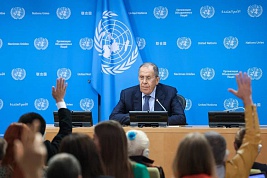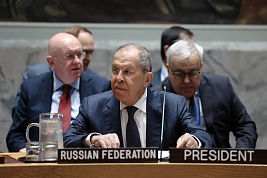TRANSCRIPT OF RUSSIAN FOREIGN MINISTER IGOR IVANOV'S REMARKS AND REPLIES TO MEDIA QUESTIONS AT PRESS CONFERENCE FOLLOWING TALKS WITH FRENCH MINISTER OF FOREIGN AFFAIRS DOMINIQUE DE VILLEPIN, MOSCOW, JANUARY 23, 2004
Unofficial translation from Russian
Foreign Minister Ivanov:
I am very pleased to once again welcome the Minister of Foreign Affairs of France, Mr. Dominique de Villepin, to Moscow.
We are maintaining continual contact, but still - a visit is always a good opportunity to exchange views on a broad range of questions of a bilateral and an international character alike. This is particularly important now, when there exist many problems in the world that the international community has to solve, and the role of Russia and France as two United Nations Security Council permanent members, as two major players not only in the European, but also in the international arena is very great.
This morning Mr. de Villepin delivered at the Russian Foreign Ministry MGIMO(U) a very thorough report on France's position on key international problems. Once again I want to stress that the positions of our two countries are very close or coincide, both in approach towards global international problems and with regard to individual questions of a regional character.
In recent years relations between Russia and France have seriously advanced in virtually all fields, primarily thanks to the efforts of the presidents of the two countries. We are pleased with the fact that Russian-French relations are an important factor in the European area and in international relations as a whole. Moscow and Paris both have a firm intention to continue the course towards the development of bilateral cooperation and the construction of a new democratic, just and secure world order that exists in the interests of all the states and peoples.
Question: Mr. de Villepin has declared that an open war has been conducted in Chechnya for several years now. It is known that France supports the political process which is beginning in the Chechen Republic, but, on the other hand, France has made quite a few critical remarks. Could you also comment on the statements of a number of non-governmental organizations and, in particular, the European Committee for the Prevention of Torture, which draws attention to obvious human rights violations in Chechnya.
Foreign Minister Ivanov (speaking after de Villepin): First of all, I cannot agree with the formulation of the question, in particular, with the allegation that a war is going on in Chechnya. There is no war in Chechnya. A struggle is being carried out there against international terrorism. Moreover, if you want to see that for yourself, I am ready to help you organize a trip to the Chechen Republic so that you can assess the true state of affairs yourself. In the Chechen Republic there goes the very complex process of political settlement against the background of the fight against international terrorism.
An important symbolic event took place yesterday. Together with the Deputy Assistant Director General of UNESCO in the presence of the President of the Chechen Republic, the President of the Republic of Ingushetia and many other representatives of Chechen society and with the participation of the diplomatic corps we present a UNESCO plan for restoring the education system in the Chechen Republic. The plan had been prepared for two years. It is a comprehensive program aimed at ensuring that the young generation in the Chechen Republic is getting ready for a peaceful life. Today, when Mr. de Villepin was interested to know my evaluations of the developments in the situation in the Chechen Republic, I said expressly that the process of political settlement, however complex it may be, bears an irreversible character. First of all, this confidence arises from the concrete aspirations of the Chechen people for a peaceful life, as was demonstrated in the course of the elections and referendum held in the Republic. We are interested in Europe having an objective perception of the processes that are developing in Chechnya. I repeat to you my offer to organize your trip to the region.
Question: Were any specific steps discussed during the talks concerning the implementation of the Road Map?
Foreign Minister Ivanov: First of all, I want to say that the positions of Russia and France on Middle East settlement coincide. We consider that the Road Map is today the concrete plan that has been endorsed by the international community and which needs to be realized in practice. Its implementation must lead to the existence of two states in the conditions of security and peace. Unfortunately, now the translation of this plan into practice has reached an impasse. It is the common task not only of Russia and France, but also of the international community as a whole to ensure that this plan begins to be implemented. We are therefore engaged in intensive consultations both with the parties in conflict and with other members of the international community in order to achieve the start of progress in carrying out this plan. From Russia's point of view, it is crucial to reach a cease-fire agreement or understanding between the parties and to start a direct dialogue between Israeli Prime Minister Ariel Sharon and PNA Prime Minister Ahmed Qurei on specific steps towards implementation of the Road Map. In the course of my talks with the PNA Minister of Foreign Affairs, Mr. Nabil Shaath, he expressed the Palestinian side's readiness for that. We also will be holding a dialogue with the Israeli side to induce it to arrive at such accords.
Question: Russia still has not ratified the Kyoto Protocol and the International Court Treaty. This question is at the center of the concept of France and the European Union regarding collective responsibility. What can you say in this connection?
Foreign Minister Ivanov: Russia has been advocating the strengthening of multilateral mechanisms in all fields. It is within multilateral mechanisms, above all, within the UN that basic issues of today should be dealt with.
As to the ratification of the Kyoto Protocol, this questions continues to be in the stage of study of the various aspects, including likely implications of the signing of the Protocol for Russia's economic growth rates. This is not a question of relations between Russia and the European Union; it is a question which bears a broader character. I think it would be incorrect to say that the key to launching the Kyoto Protocol lies in the hands of Russia. There are a whole variety of other countries which have not ratified this protocol for some reasons or other. At the same time, I want to stress once more that in taking a decision concerning ratification we will primarily proceed from our own national interests, while at the same time taking into account the opinion of our partners and, above all, the European Union.
The International Court question also is so far in the stage of intra-agency consideration.
Question: Did you the discuss the question of the situation in Iraq? Was it about sending French and Russian troops to Iraq? Is it possible to take part in political and economic decisions in Iraq before the transfer of power to the Iraqis?
Foreign Minister Ivanov (speaks after de Vileppin): Russia is ready to participate actively in the process of resolving the situation in Iraq. But to do so, naturally, appropriate conditions must first be created. Over and above anything else, it is a complete restoration of the sovereignty of Iraq and the formation in the country of an independent democratic government. It is necessary in the first place to use the potential of the United Nations and there should be more active international participation in the process of settlement. And from this point of view we think holding an international conference would be very important that would make it possible to consider all the aspects of the resolution of the situation in Iraq, to draw up an appropriate program which would receive necessary international support and also to consider the questions of regional stability in broader terms.
Question: How do you regard the latest statements of US Secretary of State Colin Powell concerning Syria?
Foreign Minister Ivanov: Mr. Powell will be in Moscow on Monday. After this we shall hold a press conference and answer this question.
January 23, 2004


